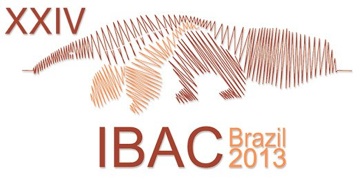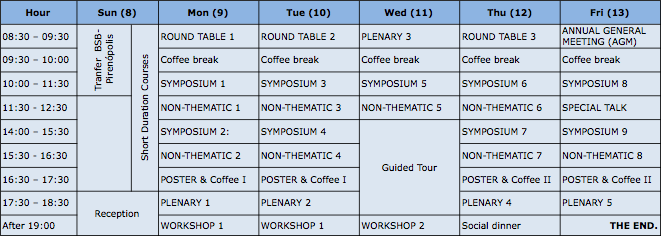Timetable


The IBAC Organizing Committee has prepared some novelties for the XXIV meeting that includes: round tables, short duration courses, workshops, and a permanent poster exposition.
PLENARY SPEAKERS
1 - Insights into birdsong biology from high-throughput brain gene expression analysis and comparative genomics. Claudio Mello (Oregon Health and Science University - USA)
2 - From uni- to multimodal signaling: towards an integrative view on anuran communication. Walter Hödl (Universität Wien - Austria ).
3 - How to communicate by voice in the noise: the example of seabird colonies.
Thierry Aubin (Centre de Neuro-Sciences Paris Sud - France)
4 - Impact of bioacoustics data on taxonomy of cicadas
Matija Gogala (Slovenian Academy of Sciences and Arts - Slovenia)
5 - The best of a bad situation: reliable information in ground squirrel alarm calls.
James Hare (University of Manitoba - Canada)
SPECIAL SPEAKER
Sound communication and the meaning of life
Peter Narins (UCLA - USA)
SYMPOSIA LIST
1. Acoustic communication within sexual context
Organizer: Fanny Rybak (France)
The symposium will present, for various animal taxa, how acoustic signals are involved in inter- and intra-sexual relationships, carry information about identity, quality and motivation, under the influence of proximal constraints and determinants, within an evolutionary perspective.
2. How bioacoustics can improve animal welfare evaluation: mechanisms and experimental design
Organizer(s): Selene Nogueira (Brazil); Patricia Black (Colombia)
It is difficult to distinguish the emotional valences by acoustic parameters; however, authors have shown evidence that acoustic parameters change during fear/friendly or unstressed/distressed contexts. This symposium will be to show the relationship between acoustic parameters and animal welfare and discuss experimental designs to evaluate vocalization parameters as welfare indicators.
3. Vocal communication in Rodents: recent advances
Organizer(s): Gabriel Francescoli (Uruguay); Patrícia Monticelli-Almada (Brazil)
The symposium will deal with recent advances in rodent vocal communication and will try to portray the diversity of rodent vocal communication, and to put up some general visions of the use of sounds for communication in this diverse group.
4. Automated acoustic monitoring: Challenges and opportunities
Organizer(s): Emanuel C. Mora (Cuba); Gonçalo Ferraz (Brazil); Greg Budney (USA); Paula Caycedo (Colombia)
We will present and explore the spectrum of ideas and approaches applied to the research of automated animal sound recognition and how this methodology may increase natural history and population ecology knowledge. Attendees will benefit from discussions about prospective strategies to develop collaborative acoustic monitoring programs at large spatial, temporal and spectral scales.
5. Low frequency acoustic signals in terrestrial vertebrates
Organizer(s): Andrew Iwaniuk (Canada)
A survey of low frequency sound producing mechanisms, behavioural studies of how low frequencies are used and the anatomical and physiological specializations that enable accurate detection and localization of these signals in terrestrial vertebrates.
6. Social learning and acoustic communication
Organizer(s): Hélène Courvoisier (France); Chris Templeton (UK)
This symposium will highlight new developments in how social factors influence learning processes related to vocal communication.
7. Vocal mimicry in birds: Context and functions
Organizer(s): Rohini Balakrishnan (India)
This symposium will examine recent advances in our understanding of the contexts and function of vocal mimicry in birds.
8. The evolution of animal vocalization
Organizer: László Zsolt Garamszegi (Spain)
Adaptations to different ecological and social constraints have led to a fascinating diversity of animal vocalizations that stimulated researches with evolutionary focus in various animal taxa. The symposium will illustrate how different selection factors can mediate natural variations in acoustic signals at various (e.g. from the within-individual to the between-species) levels.
9. Marine Bioacoustics in the XXI century: integrating new technologies to conservation and ecological studies
Organizer: Marcos Rossi-Santos (Brazil)
Marine Bioacoustics is an open research field for the future, contributing to understand the ecological processes involving marine animal sensitivity to sounds and how economic development could affect their survival. This symposium aims to offer an overview about new techniques to increase our knowledge of the marine ecosystem.
ROUND TABLES
A novelty within IBAC, round tables will hold presentations by field specialists and further discussions that will show the current state of art and the perspectives for the chosen bioacoustics field. We have the following round tables confirmed:
1. The impacts of sound pollution
Chair: Renata Sousa-Lima (Brazil)
2. Multichannel recording, and its scientific applications
Chairs: Paulo Marques (Portugal), Jennifer Foote (Canada), Thiago A. Marques (UK)
3. Bioacoustics and animal diversity
Chairs: Rafael Márquez (Spain); Simone Baumann-Pickering (USA)
WORKSHOPS
Workshops intend to solve practical problems (or make progress towards a solution) within bioacoustics.
-
1.Phylogenetic Approaches to the Study of Acoustic Signals
Organizers: Timothy Wright, Jordan Price, and Marcelo Araya-Salas (Costa-Rica)
Understanding how and why communication signals evolve is a major goal of animal behaviorists. Over two evenings this workshop will discuss various phylogenetic approaches to understanding acoustic signal evolution. Workshops will include both presentations on theory and ‘how-to’ sessions in which attendees will have the opportunity to implement different analysis methods with their own datasets. Attention will be paid to the special challenges posed by bioacoustic data. Please bring power adaptors (Brazil uses 220V)!
-
2.Neotropical Bioacoustics Society creation
Organizers: Emanuel Mora (Cuba), Maria Luisa da Silva (Brazil), Carlos de Araújo (Brazil), Paula Caicedo (Colombia)
SHORT DURATION COURSES
The short duration courses aims to give the basic on bioacoustics to undergraduate and graduate students. We expect to have the following short duration courses:
Undergraduate
1. Multichannel recording and space sound perception
Organizer: José Augusto Mannis (Brazil - in Portuguese)
2. Passive acoustic monitoring
Organizer: Felipe Penin (Brazil - in English)
3. Bat Echolocation in 3D
Organizer: Emanuel Mora (Canceled)
Graduate and professionals
-
1.Automate species identification through ARBIMON software*
Organizers: Mitchell Aide, Marconi Cerqueira (Puerto Rico - in English)
* This short course aims graduate students and professionals. A good experience with field recordings and analysis is required.
Automated recording devices have improved our ability to simultaneously monitor biodiversity in many sites. This has resulted in millions of audio recordings making it difficult to process the files. The workshop will 1) introduce the participants to the hardware, software, and on-going projects/collaborations of ARBIMON, 2) learn how to use the species identification interface, 3) create species specific identifications models, and 4) apply these models to the participant’s recordings.
SPECIAL POSTER EXPOSITION (SPE)
The Special Poster Exposition be held during afternoon’s coffee breaks. We have confirmed 11 posters from sound collections from around the globe. They will be kept permanently during IBAC, putting together curators and their public. We hope to create a place for a warm conversation on what we have and what we need in terms of wildlife documentation.
Organizers: Carlos de Araújo (Brazil) and Paulo Marques (Portugal)
SOCIAL DINNER - Social Dinner will be on September 12th on the hotel. Dinner includes a a special menu and beverages (including beer, wine and caipirinhas). It will cost R$ 98,00 + 10 % service fee per person.
GUIDED TOUR - On wednesday (11th) we will have a guided tour to Vagafogo Nature Sanctuary. Participants will have a lecture on the aspects of the Cerrado’s wildlife and walk through a 750m light trail that will allow for observations. At the end of the day we may find a waterfall to cool out. The tour includes a light meal, with fruit salad, juices, honey, cheese bread and other locally produced items. The guided tour will cost R$50.00.
TRAVEL OPTIONS - The IBAC Organizing committee has managed to build some excursions options with a local travel agency for those of you that plan to get before or after the meeting. Please take a look at the traveling options here. For adventure, click on option 1, option 2.

September 8 - 13

Click on the links for a TIMETABLE and the Poster list









